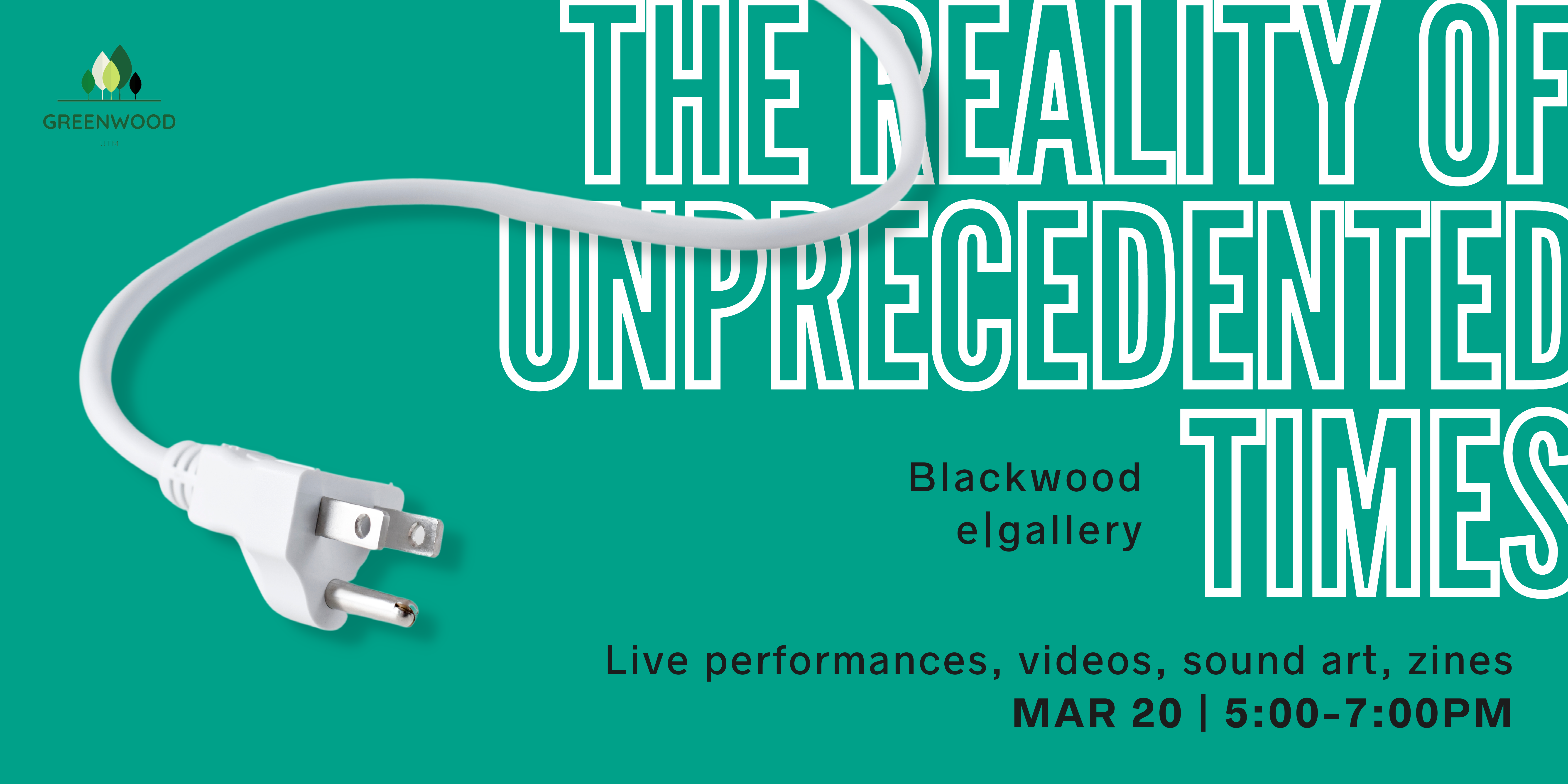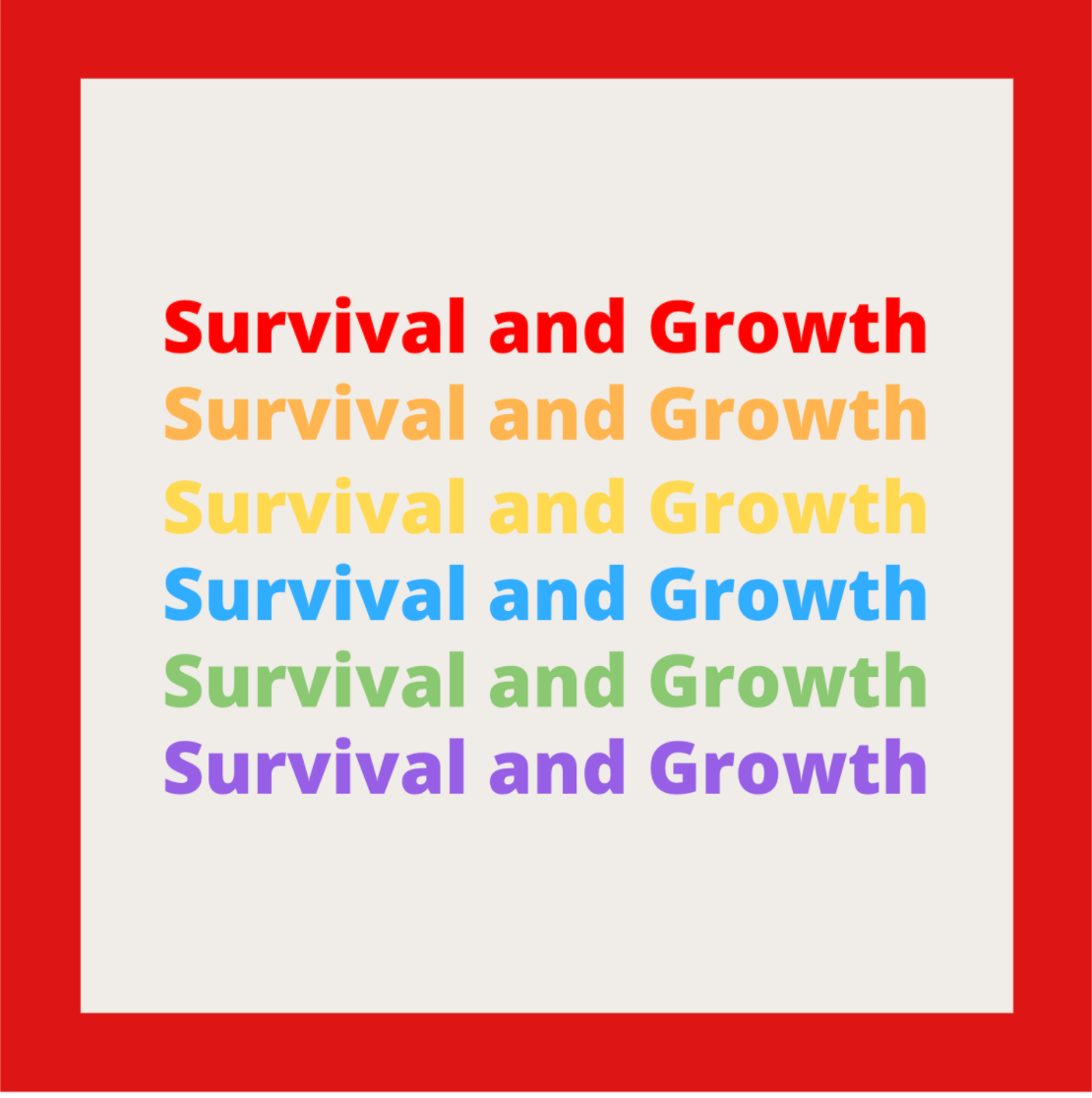The Reality of Unprecedented Times

Greenwood, with the support of The Blackwood, hosted a hybrid event of live and pre-recorded performances on Monday, March 20th, 2023, 5:00 PM - 7:00 PM
The Reality of Unprecedented Times considered how the virtual and physical worlds are converging and colliding, and the related implications for the future. This new reality has emerged from the altered relationship that humans have with their physical and digital environments as a result of the pandemic. Driven by a desire for greater intimacy with the screen and a longing to connect through it, the selected works ask the audience how hybridity can be drawn upon as a methodological approach to advancing a message, a feeling, or an artistic expression.
The phrase “unprecedented times” has become commonplace over the past few years and continues to reflect the current challenges that individuals face in adapting to a new reality. Featuring the work of emerging artists from across the Greater Toronto Area, The Reality of Unprecedented Times presents different perspectives on coping with and creating new hybrid lifestyles. This event navigates the blurred boundaries of physical, virtual and psychological spaces, presenting works that range from multimedia installations to screening of pre-recorded videos.
In dialogue with this event, the selected pieces in the zine publication adopt a variety of mediums and experimental approaches including, a poem about how memes will save the world, a painting of a zebra on Zoom calls, and a screenshot image of an essay about re-learning to read on a digital device, to name a few. The zine includes Stacey Arkhipova, Veronica Spiljak, Snack Witch Joni Cheung, Studio X, Bryce Coates, Dania Murad, Regina Adaora Agokei, Valentina Guzman-Martinez, Rosa Fragomeni, Maryna Salagub, Ciar O’Mahony, and Qurat Dar. These works have been categorised according to subthemes that start with the prefix “un-” to explore the different aspects of our experiences during the pandemic. These sub themes include “Untangled,” “Unknown,” “Unseen,” “Uncertain,” Unplug,” and “Unlearn.”
Click here to open the PDF.
Situational Inverse: Overturning Traditions

What
do you want to say to current leaders in your life? What do you wish past
leaders knew? What do you think future leaders should know?
Building on discourses sparked by the 2021 Dissolution of Parliament by Prime Minister Justin Trudeau, the Greenwood team thought a lot about the ways that we collectively engage with forms of power. Whether we are interacting with figures of authority, our peers, or our juniors, how does power inform these exchanges? Throughout the curatorial process, the goal of Situational Inverse: Overturning Traditions transformed from an exploration to being a conversational catalyst for themes of power, positionality and leadership.
Calling upon the poem I want a president (1992) by Zoe Leonard as inspiration, Greenwood employs alternative means of understanding power to theorize possible ways we can engage with power differently. The ways in which Leonard subverts traditional ideas of political figures became foundational pillars for the curatorial process. Through gestures of knowledge sharing (and acknowledging the power involved when sharing knowledge), Greenwood begins to diversify the collective understanding of what it means to lack power, to have power, and ways it occupies space within our lives.
This publication showcases the work of nine contributors: Blaire Mackenzie, Dania Sabri, Masha Le Do, Sofia Sue-Wah Sing, Sofia Suleman, Tooba Ijaz, Tyler Young and collaborative duo Chi Liu and Josephine Tianyi. With each contribution based on relevant themes, Situational Inverse: Overturning Traditions asks; how can power fluctuate? How do we collectively engage with power in the present? How can we change this treatment in the future?
Click here to open the PDF.
Situational Inverse: Overturning Traditions is a free publication supported by The Blackwood at the University of Toronto Mississauga. A PDF copy is available to view through Greenwood’s website, with limited printed copies available in archives held by The Blackwood in Mississauga and Hauser & Wirth in New York.
Definition Dissolution
Key terms and alternative ways of understanding themLeadership, noun, /ˈlēdərˌSHip/
1. the office or position of a leader
2. capacity to lead
3. the act or an instance of leading
4. leaders
A movement or action by leaders who “are willing to be vulnerable, are OK with being ‘the bad guy,’ see the value in self-care, and focus on others’ intentions, not their actions alone.” —Nick Hobson, “Ted Lasso is Reinventing Leadership and Proving that Nice Leaders can (and should) Finish First,” Inc., November 3, 2021, https://www.inc.com/nick-hobson/ted-lasso-is-reinventing-leadership-proving-that-nice-leaders-can-and-should-finish-first.html.
Positionality, noun, /puh-zish-uh-NAL-i-tee/
The social and political context that creates your identity in terms of race, class, gender, sexuality, and ability status
"Positionality is the notion that personal values, views, and location in time and space influence how one understands the world. In this context, gender, race, class, and other aspects of identities are indicators of social and spatial positions and are not fixed, given qualities. Positions act on the knowledge a person has about things, both material and abstract. Consequently, knowledge is the product of a specific position that reflects particular places and spaces.” —Luis Sánchez, “Positionality.” In Encyclopedia of Geography, ed. Barney Warf (Thousand Oaks: SAGE Publications Inc., 2010), 258, SAGE Reference.
Power, noun, /'pou(e)r/
1. legal or official authority, capacity, or right
2. possession of control, authority, or influence over others
3. a controlling group
4. physical might
5. political control or influence
“Power is—at least some of the time… a factor in a social situation because of human beings’ expectations of what might happen to them. Power can be a significant factor in social relationships even when it exists as a set of complex anticipated reactions to the assumed actions of remote social agents… power manifests itself as a complex social presence that exists in an intricate network of overlapping and contradictory relations.”—Thomas E. Wartenberg, Rethinking Power (Albany: State University of New York Press, 1992), xviii-xix.
Water Activism and Community



Greenwood, with the support of The Blackwood, hosted a community consultation event on
Thursday, July 29, 2021, 6:00 PM - 7:30 PM EDT
In this presentation and discussion, Dr. Robert Case, Associate Professor in Social Development Studies at Renison University College at the University of Waterloo discussed his practice of water activism, environmentalism, and community organizing. Dr. Case’s work was presented as part of the consultation and development of lyfeboat prototype, the development of a fully-functional boat for community use led by artist sean procyk and the Blackwood.
lyfeboat prototype is a project rooted in architectural intervention, adaptive reuse, and public engagement. Slated for launch by the Blackwood in 2022, it will serve as a gathering place for community education, a work of experimental architecture, and a self-sufficient floating sculpture.
Interested institutions, groups, and individuals were invited to discuss their ideas for how lyfeboat prototype can be used in their community.
Dr. Robert Case is an Associate Professor in Social Development Studies at Renison University College at the University of Waterloo, Ontario, and a volunteer on the board of directors of a local citizens' group called the Wellington Water Watchers. He teaches in the areas of social policy, social ecology, and community organization, and his focuses on community organization and social action, with a particular focus on community organization in the context of opposition to groundwater bottling in communities around North America.
sean procyk is an unsettler artist and playground designer. his practice focuses on creating immersive public engagements through site-specific installation, architecture and community workshops. Each project responds to its regional context, with a particular focus on the relationships that exist between landscape, community and ecology. procyk’s work explores processes of ecological succession, land-based disturbance, human alienation and collective action. he works primarily with found, reclaimed and natural materials. procyk’s works have been exhibited at Hamilton Artists Inc., Latitude 53, Stride Contemporary Art Gallery, Elemental Festival, Convergence Conference on Art and Technology in Banff, and Nuit Blanche Toronto.
Survival and Growth
This Pride month, Greenwood is highlighting past contributions to Blackwood's programming that amplify awareness for and encourage dialogue about issues relevant to the LGBTQ+ community. The Greenwood team recognizes that Pride is not just about celebration, but also about continuing to create spaces where underrepresented voices and communities are amplified. The spotlight series has organized the following artists and publications thematically according to the specific ways in which they enable us to think about care, social justice, decolonization, identity, and the future. We are sharing artistic works, articles, and projects hosted by the Blackwood that engage with these themes, including works by Thirza Cuthand, Hazel Meyer, Anthea Black, and more. We encourage you to look further into the work of contributors highlighted in this spotlight series on our instagram page.
The title for this series, Survival and Growth, comes from Sister Outsider, a collection of essays and speeches by Audre Lorde.

